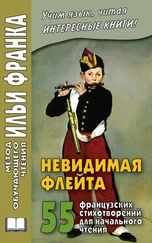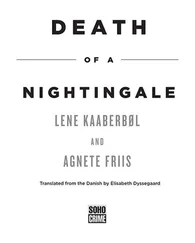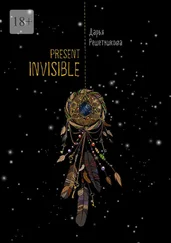Lene Kaaberbol - Invisible Murder
Здесь есть возможность читать онлайн «Lene Kaaberbol - Invisible Murder» весь текст электронной книги совершенно бесплатно (целиком полную версию без сокращений). В некоторых случаях можно слушать аудио, скачать через торрент в формате fb2 и присутствует краткое содержание. Год выпуска: 2012, ISBN: 2012, Издательство: Soho Crime, Жанр: Старинная литература, на английском языке. Описание произведения, (предисловие) а так же отзывы посетителей доступны на портале библиотеки ЛибКат.
- Название:Invisible Murder
- Автор:
- Издательство:Soho Crime
- Жанр:
- Год:2012
- ISBN:9781616951719
- Рейтинг книги:5 / 5. Голосов: 1
-
Избранное:Добавить в избранное
- Отзывы:
-
Ваша оценка:
- 100
- 1
- 2
- 3
- 4
- 5
Invisible Murder: краткое содержание, описание и аннотация
Предлагаем к чтению аннотацию, описание, краткое содержание или предисловие (зависит от того, что написал сам автор книги «Invisible Murder»). Если вы не нашли необходимую информацию о книге — напишите в комментариях, мы постараемся отыскать её.
Invisible Murder — читать онлайн бесплатно полную книгу (весь текст) целиком
Ниже представлен текст книги, разбитый по страницам. Система сохранения места последней прочитанной страницы, позволяет с удобством читать онлайн бесплатно книгу «Invisible Murder», без необходимости каждый раз заново искать на чём Вы остановились. Поставьте закладку, и сможете в любой момент перейти на страницу, на которой закончили чтение.
Интервал:
Закладка:
T HE HOUSE’S ONLYhabitable room was home to six people. Sándor’s stepfather Elvis didn’t live here anymore. He and Valeria had split up several years earlier. Both Sándor’s sisters were married now, but neither of them had actually moved out. Vanda used to have an apartment in Miskolc, but then the building was renovated, and some of the apartments combined into something larger and more “in keeping with the times,” as the property owner put it; when the tenants were due to move back in, for some reason or other there wasn’t room in the lovely, remodeled building with tiled bathrooms, renovated kitchens, and steel balconies for the three Roma families. So Vanda was living with Valeria again with her two little boys while her husband worked as a painter in Birmingham to earn money so they could get another place. Feliszia, who was seventeen now, had married a boy her own age from Galbeno, just a few months ago; he and his father were putting a roof on one of the abandoned houses on the outskirts of the village “so the young people would have somewhere to live.” Valeria quipped that at the speed those two were working; the young people would be middle-aged before they could move in. And besides, it wasn’t what Feliszia wanted. She wanted to move to Budapest or at least Miskolc, but certainly away from Galbeno.
“There’s nothing wrong with dreaming,” Valeria said as she made a bed for Sándor in the spot that was actually Tamás’s. And Feliszia noticed the hint of sarcasm in her tone right away.
“Tamás promised he would help,” she said defiantly. “He’s going to lend me the money for that hydrotherapy course, and then I can work as a carer for people with disabilities until I can afford to start my own clinic.”
Those weren’t just dreams; they were plans. Sándor looked at the determination his suddenly grown-up little sister radiated and wondered where it had come from. A year ago she had been a quiet, mild-mannered girl who was the most cautious of all the siblings.
“It’s easy for Tamás to make promises. And anyway, he doesn’t have any money,” Vanda said.
“He will. When he comes home from Denmark, he’ll have money.”
“How much does the course cost?” Sándor asked.
“Two thousand six hundred euros.”
Sándor did a quick conversion. That was more 700,000 forints. Where in the world did Tamás think he was going to get that kind of money? Certainly not from performing on street corners. Not even if he were lucky enough to get a job in a restaurant. He usually just played for tips and maybe food—if he was lucky.
“And what does Bobo say to your big plans?” Vanda asked. Bobo was Feliszia’s husband. “What does he say to a wife who wants to open her own clinic in Budapest?”
“He’d just be happy,” Feliszia said with a defiant note to her voice which revealed that she wasn’t entirely sure that was true.
“Why does Tamás think he can earn so much money in Denmark?” Sándor asked.
Valeria took the last quilt, unfolded it, shook it, and spread it out on the low built-in shelf, bench in the daytime and sleeping space at night, which ran around three of the room’s four walls.
“You shouldn’t talk about money right before bedtime,” she said in a firm voice. “And it’s bedtime now. Sándor, get out of here. Let the girls wash.”
Sándor got up. It hadn’t occurred to him that he would have to go out so his sisters could get undressed. God knows how long they had been waiting for him to leave of his own accord.
Outside it was so dark he was having trouble finding the path to the outhouse. There was a smell of wood smoke and a pig manure, as Valeria had bought a suckling pig that was being fattened up for the winter. He could hear it breathing, snuffling, and panting—presumably it was sleeping under its half roof of boards and plastic a few meters from the house.
Finally, there was the path. He made his way to the outhouse wondering how he would know when it was okay to go back in again. He felt like a bumbling idiot. When had this happened? Was it because Vanda and Feliszia were married now? Did Tamás go outside, too, to give them some privacy? Or were the rules different if you grew up together? Nothing was simple or straightforward. Maybe it would be easier for all of them if he slept in the other half of the house, even if part of the gable and some of the roof had caved in. It was summer after all. But if the wind picked up, some of the loose tiles up there could come down on his head while he slept.
The instant he opened the outhouse door, he was assaulted by yet another razor-sharp childhood memory. The darkness, the smell, the worn board with the hole in it that had been far too big for his little bottom. He had been terrified of falling in. So terrified that sometimes he would just squat down behind the chicken coop and hope no one noticed him. One time his stepfather had caught him in the act, with his pants down around his ankles. That had cost him a couple of sharp smacks.
“You’re not a goddamned animal, you filthy little brat. Only animals shit in the street!”
“Yes, but this isn’t the street.…”
The story immediately became a favorite with the whole family, told and retold with laughter and giggles, especially among the grandparents: There was the boy, squatting there with his butt hanging out, still as cocky as ever.…
Cocky. That was when you talked back to the grownups, when you were impertinent, and it was usually promptly punished. And yet there was always something ambiguous about the punishment. They didn’t spare the rod, but nevertheless there was an acceptance behind it, bordering on approval. Boys were supposed to be cocky. Calling a little boy a “pet” was an insult, on a par with calling him a “sissy” or a “Mama’s boy,” and even though disobedience could earn you a beating, too much obedience just brought you scorn.
He sat in the stinking darkness of the outhouse, no longer afraid of falling in the hole. But other than that he was by no means cocky. He had had that knocked out of him, effectively and a long time ago, and fear had eaten its way into his life. There was no defiance left in him now, no rebellion. It had been a long time since he had dared to be disobedient.
He hadn’t told Gábor and the NBH about Tamás. That was sort of rebellious, wasn’t it? Or was that just obedience to an older law? One that had been beaten, yelled, drilled, and loved into him the first eight years of his life: You stick up for your own.
He was glad he hadn’t ratted on Tamás to them. He was still furious at his brother, who had obviously acted like an asshole and a moron to boot, and the thought of the mess Tamás had landed them both in filled Sándor with a fear that was totally and utterly different in scope and extent than the everyday fear of messing up, failing, breaking written or unwritten rules, or being caught with your pants down. But in some small, overlooked, stubborn corner of his soul, he was still glad that he hadn’t told them about Tamás.
He finished and stepped out into the somewhat fresher air outside. His eyes had adjusted to the May darkness now. Here and there it was punctuated by light from the village houses’ small peephole windows combined with the bluish, white flicker of TVs. Maybe it wouldn’t be so bad living here, he thought, without heat or running water or indoor toilets, if only you didn’t see how other people lived whenever you turned on the TV. But there were TVs here, in almost every house. The antennas jostled on the decrepit roofs, their bristly metal branches jutting out in all directions to catch the best possible signal.
Valeria came out with a washbasin and tossed the soapy water out onto the stinging nettles behind the house. He took that as a signal that the coast was clear again.
Читать дальшеИнтервал:
Закладка:
Похожие книги на «Invisible Murder»
Представляем Вашему вниманию похожие книги на «Invisible Murder» списком для выбора. Мы отобрали схожую по названию и смыслу литературу в надежде предоставить читателям больше вариантов отыскать новые, интересные, ещё непрочитанные произведения.
Обсуждение, отзывы о книге «Invisible Murder» и просто собственные мнения читателей. Оставьте ваши комментарии, напишите, что Вы думаете о произведении, его смысле или главных героях. Укажите что конкретно понравилось, а что нет, и почему Вы так считаете.












